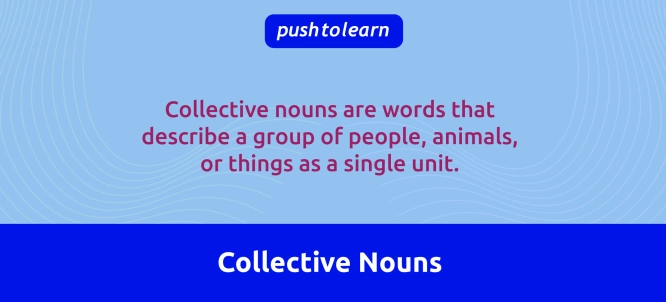by PushtoLearn
Collective Nouns
Table of Contents
Collective Nouns - Exercise
This exercise focuses on Collective Nouns
Common Collective Nouns
People
|
Collective Noun |
Meaning |
Example Sentence |
|
Team |
A group of people working together |
"The team won the championship." |
|
Class |
A group of students |
"The class went on a field trip." |
|
Crew |
A group working on a ship or plane |
"The crew prepared the plane for takeoff." |
|
Audience |
A group of people watching a show |
"The audience clapped after the performance." |
|
Family |
A group of related individuals |
"My family is having a reunion this weekend." |
Animals
|
Collective Noun |
Meaning |
Example Sentence |
|
Flock |
A group of birds |
"A flock of geese flew overhead." |
|
Pack |
A group of wolves or dogs |
"A pack of wolves howled in the distance." |
|
Herd |
A group of animals, like cattle |
"A herd of cattle grazed in the field." |
|
Swarm |
A group of insects, often bees |
"A swarm of bees surrounded the flowers." |
|
School |
A group of fish |
"A school of fish swam in the coral reef." |
Things
|
Collective Noun |
Meaning |
Example Sentence |
|
Bunch |
A group of grapes, bananas, etc. |
"She bought a bunch of bananas." |
|
Pile |
A collection of things stacked together |
"There is a pile of books on the floor." |
|
Collection |
A group of similar items |
"He has a collection of rare stamps." |
|
Set |
A group of related items |
"She bought a set of dishes for the kitchen." |
|
Fleet |
A group of ships or vehicles |
"The fleet of ships sailed out to sea." |

Rules for Using Collective Nouns
-
Singular or Plural Verb Agreement
-
Collective nouns can be singular or plural depending on context. In American English, they are often treated as singular when referring to the group as a single unit.
-
Example: "The team is winning the game." (The team as a single entity)
-
In British English, collective nouns may take a plural verb.
-
Example: "The team are arguing among themselves."
-
Common Collective Nouns in Different Contexts
-
The same collective noun can apply to different groups depending on the context. For example, "herd" generally refers to a group of animals like cattle or elephants, while "flock" can refer to birds or sheep.
-
Using the Right Collective Noun
-
Some collective nouns are specific to certain animals or things. For instance, "swarm" is usually used for insects, and "school" is reserved for fish or marine animals.
Examples in Sentences
-
"A panel of experts discussed the topic."
-
"The flock of birds migrated south for the winter."
-
"She arranged a bouquet of flowers for the wedding."
-
"The audience applauded at the end of the show."
-
"A band of musicians played at the concert."
Summary Table
|
Category |
Collective Nouns |
|
People |
Team, class, crew, audience, family |
|
Animals |
Flock, pack, herd, swarm, school |
|
Things |
Bunch, pile, collection, set, fleet |
FAQ
Can a collective noun be singular or plural?
Yes, collective nouns are usually singular when they refer to a group as one unit, but they can be plural when emphasizing individuals in the group.
Is "team" always a collective noun?
"Team" is a collective noun when it refers to a group acting together, but it can also refer to individual members if the focus is on individuals.
Can collective nouns change meaning based on the noun?
Yes, some words like "flock" can mean a group of birds, but "flock" can also refer to groups of sheep or even people metaphorically.
Are there unique collective nouns for different animals?
Yes, English has many specific collective nouns, like a "murder of crows," a "pride of lions," or a "parliament of owls."
Can you make your own collective nouns?
Yes, especially in informal settings. Sometimes people invent creative collective nouns, like "a galaxy of stars," although traditional terms are usually preferred in formal writing.

